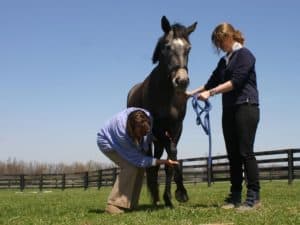Wanted: Career Revival
The talks in the conference room to the group of bright, young attendees might have sounded a bit like a revival to the uninitiated. In fact it was…well, a bit like a revival. And one that is needed sooner rather than later. Last year, from the 2,243 students who graduated from veterinary schools in North America, only 94 (4%) said they planned to become equine practitioners. That’s a
- Topics: Article
The talks in the conference room to the group of bright, young attendees might have sounded a bit like a revival to the uninitiated. In fact it was…well, a bit like a revival. And one that is needed sooner rather than later. Last year, from the 2,243 students who graduated from veterinary schools in North America, only 94 (4%) said they planned to become equine practitioners. That’s a worrisome number to horse owners, to veterinarians, and to the horse industry at large. The original idea that spawned this gathering of incoming juniors in vet schools came from Andy Clark, DVM, to Bill Rood, DVM, at a practice managers meeting. The students were invited to Kentucky over Labor Day weekend–free of charge–to learn more about the life of an equine veterinarian today, and in the future.
A total of 379 students signed up from 27 vet schools in the United States and four in Canada. I have to admit that the cynic in me (and remembering my days as a student) made me think many of these young people probably would come just for the free trip and food. I stand corrected. Of the handful of students I spoke with, all were deeply interested in what the speakers had to say. Some were undecided about whether they would be equine practitioners, but others said this was a golden opportunity to get face-to-face with a variety of equine veterinarians, ask the tough questions, and get answers and ideas from those who have “been there, done that.”
As Rood said, students need to decide where to practice, what type of practice they want to do, and what their practice specialty will be.
Money, lifestyle, compensation, type of work, and hours spent at work were among the leading topics discussed by speakers and students, albeit not necessarily in that order. Equine practice has a bad rap with some veterinary students. Some vet schools don’t encourage students to go into equine practice for a variety of reasons, not the least of which is starting pay
Create a free account with TheHorse.com to view this content.
TheHorse.com is home to thousands of free articles about horse health care. In order to access some of our exclusive free content, you must be signed into TheHorse.com.
Start your free account today!
Already have an account?
and continue reading.

Written by:
Kimberly S. Brown
Related Articles
Stay on top of the most recent Horse Health news with












